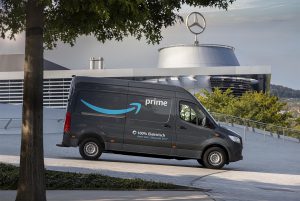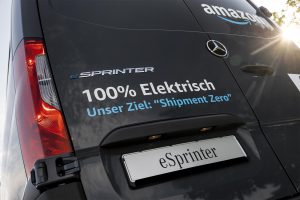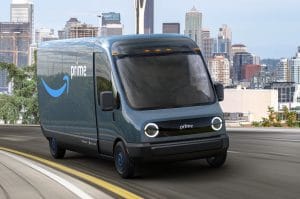
Amazon plans to add another 1,800 battery-electric delivery vans to its growing fleet, this time turning to Mercedes-Benz to supply the zero-emissions vehicles for use in Europe.
Most of the vans will go into service this year, primarily for Amazon operations in Germany and the United Kingdom. The order is the biggest yet for Mercedes’ new EV van models – but it is dwarfed by the order Amazon placed last year for 100,000 electric delivery vehicles from U.S. startup Rivian.
In announcing the deal, the partners noted that Mercedes’ parent Daimler AG has joined Amazon’s “The Climate Pledge.” The program, launched last year, calls on member companies to be operating net carbon free by 2040. Daimler had already laid out plans to get there even before that as part of its own, “Ambition2039” program.
(Amazon ties to auto industry grow stronger.)
Welcoming the automaker’s “bold leadership, Amazon founder and CEO Jeff Bezos said in a statement that, “We need continued innovation and partnership from auto manufacturers like Mercedes-Benz to decarbonize the transportation sector and tackle the climate crisis.”

Initially, Amazon relied on existing delivery services, such as the U.S. Postal Service, FedEX and UPS, to handle its growing business. It has begun building up a massive fleet of its own, however, vans with its familiar logo becoming increasingly commonplace in the U.S. and many other parts of the world.
Daimler had already become a supplier of conventionally powered vehicles for that fleet, starting in 2018.
The latest deal will give a big boost to its plan to electrify the commercial side of its business. That ranges from battery-powered versions of its Mercedes vans to the all-electric semis it is developing through subsidiaries like U.S.-based Freightliner.
Friday’s announcement sees Amazon purchasing 1,200 of the new eSprinter vans, and another 500 of the smaller eVito model. About 800 of the electric delivery vehicles will go into use in Germany, 500 in the UK.
(Amazon buys self-driving tech firm Zoox for a reported $1.2 billion.)
“I am delighted that we are further intensifying our long-standing partnership with Amazon and working together on the battery-electric future of transportation,” Marcus Breitschwerdt, head of Mercedes-Benz Vans, said in the joint statement.

The new vans will quickly roll into operation in Europe, but Amazon will have to wait until 2022 before it begins taking delivery of the new vans being developed for its U.S. operations by start-up Rivian. Eventually, that fleet will include 100,000 of the new, zero-emissions models, the biggest order to date by Rivian, which landed $2.5 billion in new funding last month from a consortium of investors led by T. Rowe Price.
Among previous investors, Ford has pumped $500 million into the start-up even though it has plans to develop an all-electric version of its own Transit van for North America.
From a slow start, demand for all-electric vehicles has taken off fast in the commercial vehicle market, with an assortment of new manufacturers entering the segment alongside established automakers also including General Motors.
On the end-user side, UPS is another delivery service making the switch, last January ordering up 10,000 all-electric trucks from British-based Arrival Ltd.
(Rivian, Amazon provide peek at new electric delivery van.)
While Amazon may be pushing to bring climate change under control, there’s a more practical and “completely unemotional” reason for the surge in EV demand, Pat Romano, the CEO of ChargePoint told TheDetroitBureau.com earlier this month. As battery costs drop and useful range increases, all-electric vehicles are both easier to maintain and cheaper to operate.







